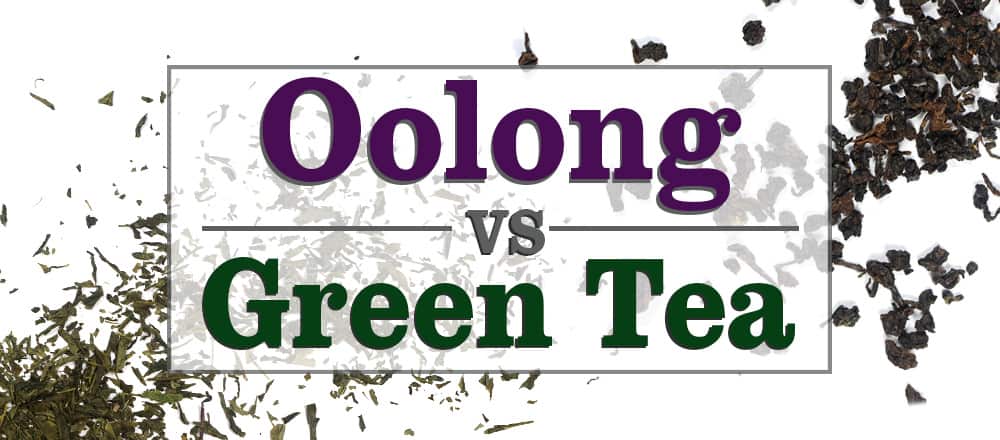Oolong Tea vs Green Tea

Today, Green Tea accounts for 20% of the world’s Tea consumption. Oolong Tea, on the other hand, accounts for less than 2%. In this sense, these two Teas couldn’t be more different, but they also share some similarities. The question begs: which one is better, let’s compare the two different tea types this this article, Oolong Tea vs Green Tea.
It’s a question that isn’t easily answered. We each drink Tea for different reasons. Some who are health conscious may consume it to improve their everyday way of life. Others may enjoy it because, simply put, it tastes great.
What’s your reason for drinking Tea? And which beverage, out of Oolong Tea and Green Tea, best suits your needs? Here at The Kent and Sussex Tea and Coffee Company, we can’t decide for you, but we can at least supply you with the facts!

Oolong Tea vs Green Tea Health Benefits
Green Tea wins the first hurdle. This is because Green Tea is the second least processed all Type of Tea, meaning it ultimately retains the highest amount of antioxidants.
These antioxidants combat free radicals in the body, which in turn are the product of natural, though harmful, human oxidation. With antioxidants fighting oxidation, one reduces the risks of developing numerous chronic conditions.
While Oolong Tea also contains antioxidants, Green Tea possesses what is arguably the best kind: Epigallocatechin gallate (EGCG). On average, one cup (approximately 240 ml) of brewed Green Tea contains up to 200 mg of EGCG. But what exactly can EGCG do?
According to a recent meta-analysis of 13 Green Tea-related observational studies, participants who drank the most Green Tea had a 28% lower risk of cardiovascular disease. Furthermore, other research has suggested that the EGCG content of Green Tea can prevent atherosclerosis.
It’s worth noting, however, that Oolong Tea can also improve one’s everyday way of life – just not quite in the same way as Green Tea. In a 2001 study, 54% of participants found that their skin had improved dramatically after six months of drinking Oolong Tea daily.
In a 2003 study, participants were given this Tea alongside regular hypoglycemic drugs, resulting in the improved balancing of blood sugar levels and the prevention of sudden drops and spikes.

Popularity of Oolong Tea vs Green Tea
Okay – statistically, Green Tea wins the second hurdle, too; but looking at it from a slightly less conventional standpoint, Oolong Tea might still have a chance!
We’re talking about the future, and what it holds for this unique beverage. Could Oolong Tea one day become as popular, if not more popular, than Green Tea? It’s a big maybe.
One could argue that, until recently, Black Tea ruled supreme in the west, with only occasional mention to any other Tea type. Then, debatably, came Green Tea – “the next big thing”.
But it’s now fair to say that consuming Green Tea in the west has become popularised, meaning there is room for yet another “next big thing”. Enter Oolong Tea? Watch this space.
The Tea Industry changes at a rapid rate, and as we’ve learned from the past, anything can happen. Here at The Kent and Sussex Tea and Coffee Company, nothing would surprise us! As such, we leave it up to you to decide what is in store for Oolong Tea, and whether or not it will one day give Green Tea a run for its money!

Taste of Oolong Tea vs Green Tea
We couldn’t possibly answer this question by ourselves, mostly because we love the taste of both Teas! Some will undoubtedly like the taste and aroma of Oolong Tea better, while others will prefer Green Tea.
It’s not up to us to make a decision in this department – it’s up to you! Only you know your own taste buds, so why not try both types of Tea and decide on your favourite?

Which Tea is Best
We now know that Green Tea has the upper hand when it comes to health benefits. The same can be said about popularity – though for how much longer is uncertain.
Finally, the taste and aroma cannot be determined here in this article because, well, everyone has different preferences when it comes to their morning cuppa; it’s as simple as that.
So who wins overall? We’ll let you decide.

 Loose Leaf Tea
Loose Leaf Tea Pyramids
Pyramids Tea Bags
Tea Bags Africa
Africa Assam
Assam Ceylon
Ceylon Chinese
Chinese Darjeeling
Darjeeling European
European Indian
Indian Japan
Japan Nepal
Nepal South East Asia
South East Asia Ayurveda Tea
Ayurveda Tea Black Tea
Black Tea Chai Tea
Chai Tea Flowering Tea
Flowering Tea Fruit Tisanes
Fruit Tisanes Green Tea
Green Tea Herbal Tea
Herbal Tea Matcha Tea
Matcha Tea Oolong Tea
Oolong Tea Organic Tea
Organic Tea Pu erh Tea
Pu erh Tea Rooibos Tea
Rooibos Tea White Tea
White Tea Asian Coffee
Asian Coffee Caribbean Coffee
Caribbean Coffee Central American Coffee
Central American Coffee South American Coffee
South American Coffee Coffee Blends
Coffee Blends Decaffeinated Coffee
Decaffeinated Coffee Espresso Coffee
Espresso Coffee Ethically Sourced Coffee
Ethically Sourced Coffee Flavoured Coffee
Flavoured Coffee Organic Coffee
Organic Coffee Single Origin Coffee
Single Origin Coffee Chocolate 1
Chocolate 1 Chocolate 2
Chocolate 2 Chocolate 3
Chocolate 3 Chocolate 4
Chocolate 4 Chocolate 5
Chocolate 5 Chocolate 6
Chocolate 6 Chocolate 7
Chocolate 7 Chocolate 8
Chocolate 8 Chocolate 9
Chocolate 9 Loose Tea Filters
Loose Tea Filters Tea Accessories
Tea Accessories Tea Bricks
Tea Bricks Tea Caddies
Tea Caddies Tea Caddy Spoons
Tea Caddy Spoons Tea Gift Ideas
Tea Gift Ideas Tea Infusers
Tea Infusers Tea Strainers
Tea Strainers